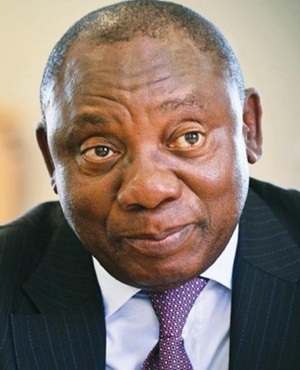
14 February was a good day in South Africa – not for the country itself, not for its people, but for the manifestation of divine justice. The now-former president of South Africa, Jacob Zuma, resigned from his office. His reign was marked by immense, shameless corruption and greed, and the increase of general godlessness. Innumerable scandals marked his nine years at the helm of the country and, as he departs, he still has literally hundreds of corruption-related charges hanging over his head. In the end it was his own political party, the African National Congress, that pressured him into resigning. The fact that he has now fallen in such a dishonorable way is a testimony to divine providence’s rule over the coming and going of godless leaders, of which Zuma was certainly one. Virtually no one from any side of the political spectrum will look back positively to his legacy.
Yesterday afternoon, Cyril Ramaphosa was inaugurated as the country’s new leader. Because Zuma will go down as the most corrupt president in South African history, there is a sense among most South Africans that a new dawn for the country has arrived. Many white South Africans regard Ramaphosa as a political savior destined to lead the country back on the road to prosperity. The mainstream media, elated by Zuma’s departure, presents Ramaphosa as the new nation-builder destined to continue the (highly distorted) legacy of Nelson Mandela. Many (liberal) investors have already started pumping millions back into the economy just hours after Zuma’s resignation.
While short-term investor confidence might ensure some relief for the failing economy, this optimism is misguided.
It must not be forgotten that, as was the case with Mugabe, the lying mainstream media chose to expose Zuma’s corruption. We know that there are many leaders with skeletons in their closets, but those who remain completely obedient to their overlords tend to be overlooked or at least granted some leverage from the mainstream media. In Zuma’s case it may have been his geopolitical strategy of strengthening South Africa’s position within the BRICS alliance, accompanied by a gradual shift in trade partners to the east. This was actually a good move for the country, but globalists could have possibly seen this as threatening the ideological hold of Western Cultural Marxism on the nation, the ideology that put the Black government in power in the first place.
Ramaphosa is South Africa’s fifth black president since his openly Marxist party took power back in 1994. He served as deputy president to Zuma for four years. Yet he has refused to distance himself from his “comrade” Zuma’s open corruption. He has also served as the leader of openly Marxist labor unions.
As one of the wealthiest people in the country, Ramaphosa’s wealth is largely due to his own corruption and (admittedly) good investments made with the millions in taxpayer money he has received, rather than his own entrepreneurship.
While he has a good share of interest in the prosperity of the private sector, he has echoed his predecessor’s call to confiscate white-owned property without compensation. The reason many white liberals remain positive despite this is because they believe this to be simply rhetoric, rather than his actual position. As one liberal commentator justified his comments: “He gives a new meaning to old struggle terminology.”
All this points to the fact that while we may see a more competent man at the helm, this could in itself be potentially catastrophic for the white man in South Africa, because he could, more so than Zuma, actually, and more efficiently, implement the government’s tyrannical policies.
As Boer nationalists, we are to take heed against this false optimism and hope in the future multicultural South Africa. This country is already beyond repair. Secession, the creation of a white homeland, remains our only means of deliverance. I continue to pray for and work towards that goal, no matter who the ANC’s president is.
| Tweet |
|
|
|




